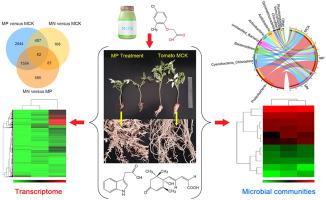Journal of Hazardous Materials ( IF 12.2 ) Pub Date : 2021-03-27 , DOI: 10.1016/j.jhazmat.2021.125767 Jian Zhang 1 , Tingting Guo 2 , Qingqing Xiao 3 , Pengcheng Wang 1 , Hongmei Tian 1

|
The herbicide 4-chloro-2-methylphenoxy acetic acid (MCPA) is widely used to control the spread of broad-leaved weeds in agricultural soils, though it remains unclear how tomato plants cope with the phytotoxic effects of MCPA at the molecular level. In this study, RNA-seq and Illumina MiSeq were used to sequence bacterial communities in tomato rhizosphere soils treated with MCPA and the phosphate-solubilizing bacterial strain N3. The results showed that MCPA induced abnormal growth of lateral roots in tomato seedlings and reduced uptake of the nutrients N, P, and K as well as the hormone (ABA and GA3) levels. Inoculation with strain N3 increased nutrient uptake by roots and increased levels of the hormones ABA, ZEA, and JA in tomato seedlings and also increased the abundance of the phyla Proteobacteria and Gemmatimonadetes in soil under MCPA treatment. GO functional groups in which differentially expressed genes (DEGs) are involved included DNA binding transcription factor activity, transcriptional regulator activity, enzyme inhibitor activity, and cell wall biogenesis. The highest numbers of DEGs are annotated to ribosome, photosynthesis, and carbon metabolism categories. Our findings provide valuable information for the application of strain N3, which is beneficial for reducing the toxic effect of MCPA on vegetable plants.
中文翻译:

溶磷菌接种4-氯-2-甲基苯氧基乙酸对番茄基因表达和根际细菌群落的影响
除草剂4-氯-2-甲基苯氧基乙酸(MCPA)被广泛用于控制阔叶杂草在农业土壤中的传播,尽管尚不清楚番茄植物如何在分子水平上应对MCPA的植物毒性作用。在这项研究中,使用RNA-seq和Illumina MiSeq对MCPA和可溶解磷酸盐的细菌N3菌株处理的番茄根际土壤中的细菌群落进行测序。结果表明,MCPA诱导番茄幼苗侧根异常生长,并减少了对养分N,P和K以及激素(ABA和GA3)的吸收。接种N3株会增加根部吸收养分并增加ABA,ZEA,番茄幼苗中的JA和JA以及在MCPA处理下还增加了土壤中门菌和细菌芽孢杆菌的丰度。涉及差异表达基因(DEG)的GO官能团包括DNA结合转录因子活性,转录调节活性,酶抑制剂活性和细胞壁生物发生。DEG数量最多的是核糖体,光合作用和碳代谢类别。我们的发现为菌株N3的应用提供了有价值的信息,这对于降低MCPA对蔬菜植物的毒性作用是有益的。DEG数量最多的是核糖体,光合作用和碳代谢类别。我们的发现为菌株N3的应用提供了有价值的信息,这对于降低MCPA对蔬菜植物的毒性作用是有益的。DEG数量最多的是核糖体,光合作用和碳代谢类别。我们的发现为菌株N3的应用提供了有价值的信息,这对于降低MCPA对蔬菜植物的毒性作用是有益的。






























 京公网安备 11010802027423号
京公网安备 11010802027423号